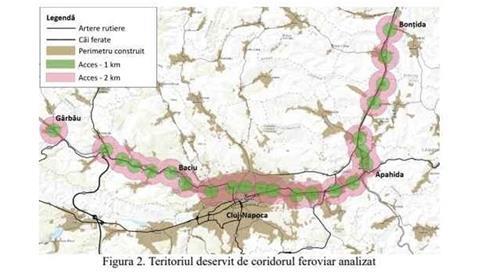
ROMANIA: Cluj-Napoca city council approved the results of a feasibility study into a 48·8 km suburban rail scheme linking Bonțida with Gârbău via the city’s main station.
An application for EU funds is to be lodged before the end of the year, Mayor Emil Boc told local media after the meeting on October 22.
The 1·15bn lei Cluj Metropolitan Train scheme led by the municipality covers upgrading of an existing line running east-west across the conurbation. This would be electrified, and eight new stations built along with refurbishment of five existing ones. New grade separated road and pedestrian crossings would be built, and existing level crossings modernised.
As part of a separate project, works to upgrade and electrify the main line from Cluj-Napoca to Oradea in the west of the country are already underway.
A fleet of nine three-car trainsets is planned to operate the service, each with a capacity of 420 passengers including 310 seated.
The municipality plans to call tenders for the operation of the services under a public service obligation contract.
The municipality expects the project to be financed jointly from the European Union’s Transport Programme 2021-27 for Romania, as well as by the Ministry of Transport, Cluj county and the municipalities of Cluj-Napoca, Bonțida, Gârbău, Baciu, Apahida and Jucu.
The suburban railway is to serve 23 stations, eight of which would be in Cluj-Napoca, including one at the Avram Iancu Cluj International Airport. Trains would run at a maximum speed of up to 150 km/h, giving an end-to-end journey time of 1 h 5 min.
A half-an-hourly service would be provided between 06.00 and 19.00 and trains would run hourly between 5.00 and 06.00 and 19.00 and 22.00.
‘The suburban rail project is of special importance for the reduction of car traffic and urban development in Cluj-Napoca. According to the study approved today, the suburban railway will facilitate the daily travel of nearly 17 000 commuters by connecting Cluj-Napoca with the surrounding municipalities’, said Emese Oláh, Deputy Mayor of the city.



